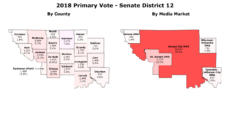Missouri’s non-farm employment rose by more than 70,800 jobs between September 2020 and last month, showing a steady rebound from the impacts of the COVID-19 pandemic on Missouri’s workforce.
Service-providing jobs hit hard by the pandemic last year, including leisure and hospitality jobs, increased substantially compared to last year, according to the September jobs report. Nearly 30,000 jobs were added in that sector over the year, while professional and business services employment surged with 23,500 new jobs.
“Thanks to a common sense approach our economy remains strong,” Gov. Mike Parson said on social media.
Thanks to a common sense approach our economy remains strong.
✅Our unemployment rate dropped to 3.8%… well below the national rate
✅We recovered 95% of manufacturing jobs lost during the pandemic
✅Businesses are investing & relocating to Missouri – creating NEW jobs pic.twitter.com/UEir4ANSuO— Governor Mike Parson (@GovParsonMO) October 20, 2021
Not all sectors were prosperous over the year: Financial activities and information jobs decreased by 7,900 and 2,500 jobs, respectively.
Employment rates increased for the month by around 7,500 jobs, with most of the gains in the service-providing, professional and business services, and trade and utility sectors. Government employment saw the largest decrease for the month with 1,100 jobs lost.
Seasonally-adjusted unemployment rates dropped from 4 percent to 3.8 percent from August, remaining below the 4.8 national rate. Unemployment decreased 1.6 percent compared to the same time last year.
The state reached a record low unemployment rate in 2018 at 3.1 percent and remained low until the pandemic struck in March 2020, with a near-8 point spike reported the following month. Unemployment decreased over the year and has remained healthy in 2021 thus far.
Despite the improvements, current events may have had an impact on employment rates. Not only has the state seen a resurgence in COVID-19 case rates and reinstated health ordinances, but the manufacturing industry is also reeling from a global microchip shortage causing production delays for everything from gaming consoles to cars and 5G equipment.
The country is also experiencing supply chain issues with overseas factories closed due to the pandemic, shipping delays, and labor shortages.

Cameron Gerber studied journalism at Lincoln University. Prior to Lincoln, he earned an associate’s degree from State Fair Community College. Cameron is a native of Eldon, Missouri.
Contact Cameron at cameron@themissouritimes.com.






























